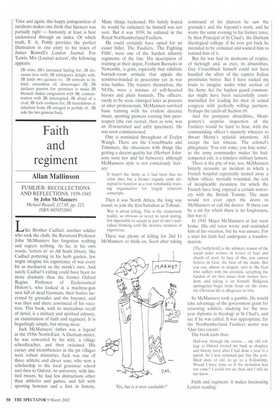Faith and regiment
Allan Mallinson
FUSILIER: RECOLLECTIONS AND REFLECTIONS, 1939-1945 by John McManners Michael Russell £17.95, pp. 225, ISBN 0859552691 Like Brother Cadfael, another soldier who took the cloth, the Reverend Professor John McManners has forgotten nothing and regrets nothing. As he, in his own words, 'totters in' to All Souls library, like Cadfael pottering in his herb garden, few might imagine his experience of war every bit as mediaeval as the monk's own. And surely Cadfael's calling could have been no more dramatic than the former Oxford Regius Professor of Ecclesiastical History's, who looked at a machine-gun nest full of dead Germans, their bodies lacerated by grenades and the bayonet, and was then and there convinced of his vocation. This book, with its meticulous recall of detail, is a military and spiritual odyssey, an examination of faith and regiment. It is beguilingly simple, but strong meat.
Jack McManners' father was a legend in the 1930s North-East. A Durham miner, he was converted by his wife, a village schoolteacher, and then ordained. His curacy and incumbencies in the pit villages were robust ministries. Jack was one of three athletic and clever sons, who won a scholarship to the local grammar school and then to Oxford. At university, with limited means, he had few distractions other than athletics and games, and left with sporting honours and a first in history. Many things beckoned. His family hoped he would be ordained; he himself was not sure. But it was 1939; he enlisted in the Royal Northumberland Fusiliers.
He could certainly have opted for an easier billet. The Fusiliers, 'The Fighting Fifth', were one of the hardest infantry regiments of the line. His description of training at their depot, Fenham Barracks in Newcastle, is grim, especially that nihilistic barrack-room attitude that appals the sensitive-minded in peacetime yet in war wins battles. The trainers themselves, the NC0s, were a mixture of soft-hearted heroes and plain bastards. The officers, rarely to be seen, emerged later as poseurs or utter professionals. McManners survived basic training with his evident decency intact, sporting prowess earning him peerrespect (the raw recruit, then as now, was an ill-nourished and unfit specimen). He was soon commissioned.
One is reminded throughout of Evelyn Waugh. There are the Crouchbacks and Trimmers, the obsessions with things like getting a decent-quality hat (Herbert Johnsons were few and far between), although McManners style is not consciously literary:
It wasn't the Army as it had been that we came into, but a former organic unity disrupted to function as a vast ramshackle training organisation for largely reluctant conscripts.
Then it was North Africa, the long way round, to join the first battalion at Tobruk: War is about killing. This is the elementary reality, so obvious as never to need stating, but impossible to accept as part of one's individual thinking until the decisive moment of experience.
There was plenty of killing for 2nd Lt McManners to think on. Soon after taking command of his platoon he saw the grenade's and the bayonet's work, and he wrote the same evening to his former tutor, by then Principal of St Chad's, the Durham theological college: if he ever got back he intended to be ordained and wanted him to remind him of it But his war had its moments of respite, of furlough and, as ever, its absurdities. Guy Crouchback himself could not have handled the affair of the captive Italian prostitutes better. But I have racked my brain to imagine under what section of the Army Act the hapless guard commander might have been successfully courtmartialled for leading his men in sexual congress with perfectly willing partners. Perhaps the catch-all Section 69.
And for pompous absurdities, Montgomery's surprise inspection of the Fusiliers would be hard to beat, with the commanding officer's masterly wheezes to thwart Monty's spiteful intentions. All except the last wheeze. The colonel's phlegmatic 'You win some, you lose some', as the army commander makes his badtempered exit, is a timeless military lament.
There is the pity of war, too. McManners bitterly recounts an incident in which a French hospital repeatedly turned away a fellow officer, mortally wounded, the sort of inexplicable meanness for which the French have long enjoyed a certain notoriety with the British Tommy. The nuns would not even open the doors to McManners or call the doctor. 'If there can be a sin for which there is no forgiveness, this was it.'
In 1945 Major McManners at last went home. His old tutor wrote and reminded him of his vocation, but he was unsure. For a start his faith had undergone a transformation:
[The battlefield] is the ultimate reason of the social order written in letters of Lead and shards of steel. In face of this, you cannot believe in God, the God of the deists. But you can, almost in despair, turn to the God who suffers with his creation, accepting the burden of sin that arises from human freedom, and taking it on himself. Religious apologetics begin from Jesus on the cross: the Christian life is allegiance to him.
So McManners took a gamble. He would take advantage of the government grant for returning soldiers, studying for the twoyear diploma in theology at St Chad's, and see if he was called. It was appropriate, for the Northumberland Fusiliers motto was 'Quo fata vacant.'
The book ends thus:
Half-way through the course ... my old college at Oxford invited me back as chaplain and history tutor after I had done a year in a parish. So I was ordained just like the portfilled dons of old, to go to a Fellowship. Would I have done so if the invitation had not come? f could not say then and I still do not know.
Faith and regiment: it makes fascinating Lenten reading,














































































 Previous page
Previous page